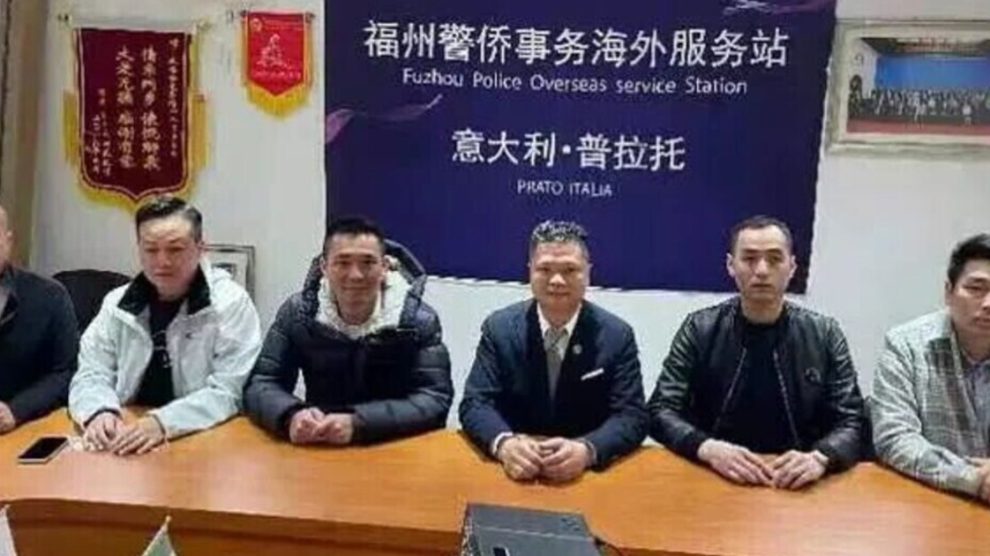Chinese police in an Italian town? An investigation by Il Foglio has centred on the Tuscan city of Prato, home of the second-largest Chinese community in Italy, where Beijing’s authorities have apparently opened a local police division.
- The Fuzhou Overseas Police Station is located in via degli Orti del Pero 2, a few steps from the city’s historical centre. This is also the headquarters of the Cultural Association of the Fujian Chinese Community in Italy.
An administrative endpoint… The Station was opened in March, according to an official message circulated on the WeChat groups – commonly used by the Chinese diaspora – catering to Chinese citizens who reside in Italy. Ostensibly, it was established to facilitate their handling of several domestic affairs.
- “We want to lend a hand to people from Fujian who need administrative assistance, such as renewing their driving licences or obtaining visas,” explained Liu Bingzi, president of the Association, to La Nazione.
- Prato’s mayor Matteo Biffoni also dismissed suspicions, citing the Association’s years-old and well-known operation and its civilian staff.
- Under “Operation Overseas 110,” 30 such stations have been opened in 21 countries across the world to aid the Chinese citizens who could not make the trip back home – a common occurrence, considering the draconian Covid rules imposed by Beijing.
… or a parallel police force? However, the Station in Prato is seriously unusual, if not outright illegal. The chief suspicion is that the purely administrative front hides a broader architecture of security and control – linked up with the police force systems in China and employing the same authoritarian, privacy-denying practices on Italian soil.
- Pictures from the official article show a Chinese citizen connected via webcam to the Fuzhou department, with a third screen displaying what appears to be a citizen ID.
- The local prefecture tried to dismiss suspicions by claiming that the Station’s name had been mistakenly translated as “Police.” Even though the relative Chinese character has no other plausible translation, and the very officials residing there themselves wrote “Police” under the Chinese name.
The Canadian case. More evidence lines up in the form of a story by The Paper (owned by Shanghai United Media Group) about a Chinese citizen residing in Canada, who approached her city’s Fuzhou Overseas Police Station because she had been a victim of online fraud. An officer in Fuzhou, China, claimed to treat overseas claims as if they were domestic.
- All of these cases, concludes Il Foglio’s Giulia Pompili, suggest that the Prato Station might work as an intelligence-gathering and criminal report office, directly involving the Chinese police.
Better look into it. Italian authorities have not been officially notified of the Station’s opening. When reached by Il Foglio, the Italian police dismissed concerns by stating that “it only deals with administrative practices and not public security.”
- In the latter case, maintaining a Chinese police office on Italian soil would be illegal.
- Also, several NGOs and media investigations noted that authoritarian countries such as China “have long used their law enforcement agencies intended for citizens abroad to control dissidents, pressure those who flee the country, and as a deterrent for those who would want to escape.” As China propaganda posters say, wrote Ms Pompili, “the Party and authorities have eyes everywhere.”
Adolfo Urso’s warning. The chairman of Parliament’s Intelligence Committee, a longtime advocate of keeping authoritarian influences in check, spoke to Il Foglio about the potential threat behind the Prato Station. “Today we know that [any] Chinese policeman [and any] Chinese CCTV camera isn’t installed to contribute to our security, but rather to advance their strategy of control and oppression.”
- In 2018, actual uniform-wearing Chinese police officers arrived in several Italian cities as part of an obscure agreement signed between the Chinese police forces and their Italian counterparts in 2015.
- The highly unusual agreement envisaged the joint patrolling of areas frequented by Chinese citizens for tourism. The practice was suspended in 2020 due to the pandemic restrictions.





